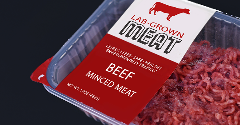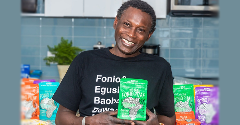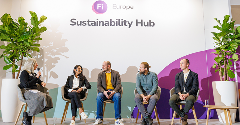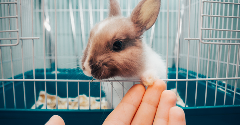News
Lidl Cheddar cheese shows rising popularity of carbon neutral food
31 May 2021Hard discounter Lidl will launch a carbon-neutral Cheddar cheese in UK stores before the end of the year. Are carbon neutral products the next big thing in sustainable food?
Chilled cheese is the second biggest carbon emitter in Lidl’s British supply chain, second only to fresh meat, said the German retailer.

Lidl hopes to achieve carbon neutrality for the Cheddar cheese product by helping its supplier, Wyke Farms, reduce on-farm emissions. This will be done by implementing best practice in five key areas covering feed management, soil and land management, manure management, herd management and energy management.
Specific actions that farmers could adopt include reducing fertiliser use, converting to deforestation-free feed or using low food-mile feed, Lidl said in a statement. However, it admitted that in order to reach the goal of carbon neutrality, it would also need to purchase carbon credits.
‘Future-proofing farming’
The supermarket’s pledge, which will be verified by independent third-party organization, The Carbon Trust, could result in savings of around 22.5 million kilos of CO2 a year.
Amali Bunter, head of responsible sourcing and ethical trade at Lidl GB said the aim of introducing more sustainable practices was to “future-proofing British farming”.
“Our partnership with Wyke Farms is aiming to tackle some of the barriers to addressing carbon-neutrality in farming. Developing a closed-loop system requires significant investment, but we believe that this pioneering programme will help set the standard for our supplier practices going forward,” she said.
Lidl and Wyke Farms are also working together on a bigger ambition to pioneer a closed-loop system by 2030, which will ensure that carbon neutrality is being achieved from completely within the supply chain itself. As part of this closed-loop system, the programme aims to incorporate carbon captured by Wyke farms through the process of turning bio-waste from local Lidl stores and suppliers into renewable energy, paving the way for a fully sustainable dairy farming model.
Carbon-neutral has growing traction
Over one-third of global greenhouse gas emissions caused by human activity can be attributed to the way we produce, process and package food, according to a recently-published study funded by the United Nations (UN).
Demand for plant-based food and drink, seen as inherently more sustainable and environmentally friendly, has exploded in recent years. But there is also growing interest in products that show their sustainable credentials in other ways, such as carbon neutrality or life cycle assessments.
A 2020 survey commissioned by the Carbon Trust found that two-thirds of the 10,000 consumers polled supported carbon labelling on products while 64% said they were more likely to think positively about a brand that could demonstrate it had lowered the carbon footprint of its products.
Plant-based, non-profit organization ProVeg International collaborated with Lidl to develop its German Next Level range, surveying thousands of consumers to understand what they were looking for in products. Lidl applied these findings to the range, which comes in fully recyclable packaging with reduced plastic content. Products in the range also provide on-pack information on its carbon footprint.
“Private label ranges are changing from niche to mass, said Verena Wiederkehr, international head of food industry and retail at ProVeg International, in an Fi CONNECT webinar last year. “Before they were tailored towards vegans and vegetarians, [and] the packaging design and the message conveyed reflected this. Today, we can truly see that private labels are targeting flexitarians, such as Lidl’s Next Level, which is more inclusive.”
Wiederkehr noted that Austrian hard discounter Hofer provides an on-pack life cycle assessment for products in its Back to Origins range while Rewe-owned German discounter Penny now displays ‘the true cost of food’ alongside the actual retail price on 16 of its private label products sold in one of its stores in Berlin.
Penny asked researchers at the University of Augsburg to calculate the true cost of the products when taking into account externalities such as carbon and nitrogen emissions, energy consumption and the impact of over-fertilisation.
The researchers estimated that gouda cheese, for instance, should be 88% more expensive than the current market price. By informing consumers of this discrepancy, Penny said it hoped to highlight the true cost of current consumption habits.
Related news

Israel approves Aleph Farms’ cell-cultured beef in world first
1 Feb 2024
Israel has granted the first regulatory approval for the commercial sale of cultivated beef, joining the US and Singapore in officially recognising cultivated meat’s role towards protein diversification.
Read more
Fazer and Solar Foods launch snack bar made with air protein
30 Jan 2024
Finnish food manufacturer Fazer has teamed up with foodtech startup Solar Foods to launch a limited-edition snack bar in Singapore made using a novel, carbon-fed microbial protein.
Read more
Big brands invest in precision fermentation-derived palm oil
25 Jan 2024
Although still not approved for food applications, big brands such as Unilever and Doehler are investing in precision fermentation-derived palm oil in a bid to reduce the environmental impact associated with this conventional palm oil.
Read more
Supergrain fonio expands its reach in US market
11 Jan 2024
More US consumers will find nutritious, climate-smart grain fonio in supermarkets thanks to a new distribution structure for the import’s most prominent commercial brand, Yolélé.
Read more
Sustainability meets innovation at Fi Europe 2023's Sustainability Ingredients Zone
9 Jan 2024
Fi Europe’s Sustainable Ingredients Zone showcases ingredients forging a path toward a greener future. Three innovators are redefining what sustainability within the food and beverage industry means, with upcycled products, regenerative agriculture, an...
Read more
Supermarkets innovate with private label plant-based ranges
9 Jan 2024
Plant-based product ranges are an important part of retailers’ private label innovation efforts – and represent an important way for supermarkets to reduce their environmental impact.
Read more
The UK prepares to open food security science centre
2 Jan 2024
Amid global food insecurity, the UK government says it is committed to producing crops resilient to climate change and addressing hunger and malnutrition with a food security science centre.
Read more
Novel food safety platform could eliminate animal testing
21 Dec 2023
The European Food Safety Authority (EFSA) has introduced a new platform that has the potential to eliminate animal testing in the food industry.
Read more
Water-conscious consumers, upcycled food, and tech-driven sustainability: Highlights from Fi Europe, part 2
14 Dec 2023
With climate change becoming a tangible reality, consumers’ environmental concerns are changing. At Fi Europe, market analysts revealed how people are now interested in everyday issues like water shortages and tech-driven solutions such as GM drought-r...
Read more
The food industry’s single-use packaging problem
12 Dec 2023
The food industry’s reliance on single-use packaging is a sustainability “sticking point” with viable alternatives not widely available – but new EU rules mean food businesses will remain responsible for the collection and disposal of the packaging the...
Read more